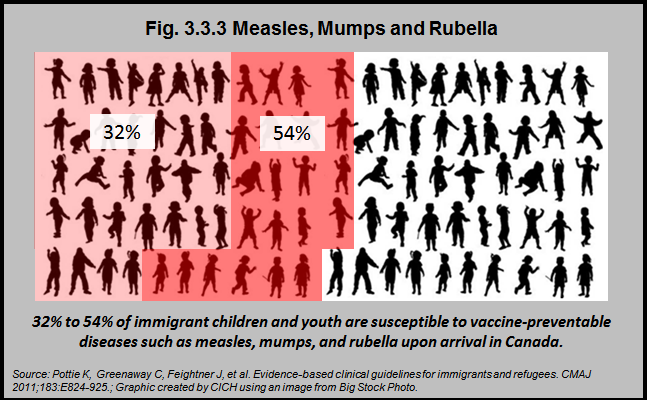Measles, Mumps and Rubella

Many immigrant children and youth are susceptible to vaccine-preventable diseases upon arrival in Canada – such as measles, mumps and rubella (German Measles). Evidence indicates that 32%–54% are susceptible to these three diseases.1. While routine childhood vaccination began in the mid-seventies in most developing countries – and many include measles – rubella and mumps vaccines are not administered routinely in most of these developing countries.2 Most recent reported cases of congenital rubella syndrome and neonatal tetanus have occurred in children who were born to women who were not immunized and were foreign born.3
1Pottie K, Greenaway C, Feightner J, et al. Evidence-based clinical guidelines for immigrants and refugees. CMAJ 2011;183:E824-925.
2World Health Organization. WHO vaccine-preventable diseases: monitoring sys- tem. 2004 global summary. Geneva; The Organization; 2004. Cited in Pottie K, Greenaway C, Feightner J, et al. Evidence-based clinical guidelines for immigrants and refugees. CMAJ 2011;183:E824-925.
3Danovaro-Holliday MC, LeBaron CW, Allensworth C, et al. A large rubella out- break with spread from the workplace to the community. JAMA 2000;284:2733-9. And Craig AS, Reed GW, Mohon RT, et al. Neonatal tetanus in the United States: a sentinel event in the foreign-born. Pediatr Infect Dis J 1997;16:955-9 cited in Pottie K, Greenaway C, Feightner J, et al. Evidence-based clinical guidelines for immigrants and refugees. CMAJ 2011;183:E824-925
Implications
Measles, mumps and rubella are highly contagious diseases that can have serious consequences. Measles infection can cause encephalitis In 1/1,000 children4; mumps can cause deafness and meningitis5 and a baby born to a mother with no protection against rubella who has come in contact with the disease during her pregnancy could be born deaf, blind, or with heart or brain damage.6 Measles-mumps-rubella vaccine is extremely effective against measles and rubella – protecting almost 100% of children immunized. While the mumps vaccine effectiveness is lower – it still protects the majority of children immunized.
Canadian Immigrant Health Guidelines recommend that all immigrant and refugee children and youth with missing or uncertain vaccination records be vaccinated for measles, mumps and rubella using age-appropriate vaccination.7
For the Canadian Immigrant Health Guidelines click here.
4Public Health Agency of Canada. What you need to know about measles. http://www.phac-aspc.gc.ca/im/iyc-vve/faq-dis-mal/mumps-oreillons-eng.php .
5Public Health Agency of Canada. What you need to know about mumps. http://www.phac-aspc.gc.ca/im/iyc-vve/faq-dis-mal/mumps-oreillons-eng.php
6Public Health Agency of Canada. What you need to know about rubella). Public Health Agency of Canada. What you need to know about varicella (chickenpox). http://www.phac-aspc.gc.ca/im/iyc-vve/faq-dis-mal/varicell-eng.php
7Pottie K, Greenaway C, Feightner J, et al. Evidence-based clinical guidelines for immigrants and refugees. CMAJ 2011;183:E824-925
